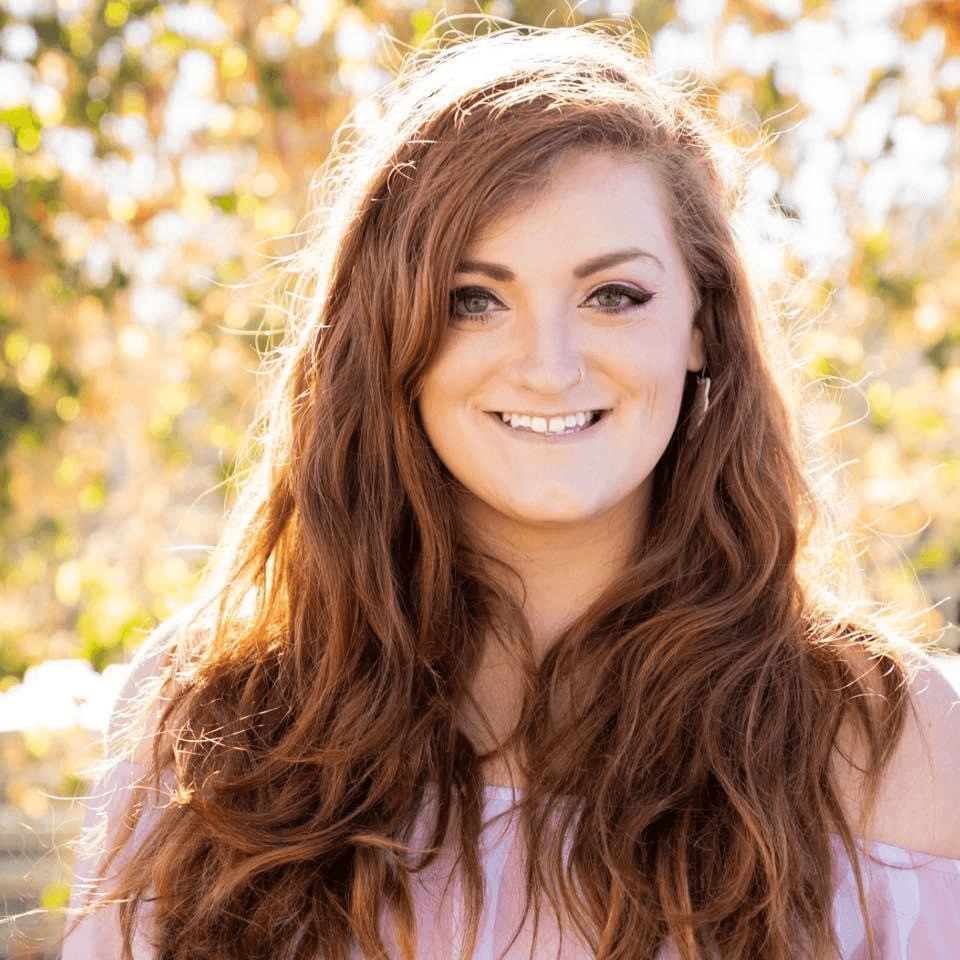
Welcome back to SafeHouse Denver's ongoing series, which explores a typical workday for Advocates across the agency and how their specialized roles support survivors.
Mary Glittenberg is an Advocate in the Adult Program at our Emergency Shelter, where she works with clients individually and also leads support group sessions.
In her own words, Mary shares how her journey as a survivor – along with a passion for art – helps her connect with clients and empower them to reach their goals.
How did you get started in the human services field?
"I’m originally from Wisconsin. I've lived here in Denver for a little over two-and-a-half years. I moved here from Nashville, where I worked at the YWCA, which was the biggest domestic violence shelter in Tennessee. I went to college as a theater major, and then I actually became a domestic violence survivor myself. That was something that really changed my passion and what was within me. You can always read out of a textbook what's happening, but for somebody to sit down with you and say 'I've felt some of these same feelings?' Obviously, everybody's situations are different, but there are things where hearing them from somebody else is validating, important and compassionate. So I wanted to finish my degree to be able to do domestic violence support services. To be honest, my university withdrew me because they thought my abuser was going to kill me. So I went home, went to cosmetology school, got that license… but I wanted to finish [my degree]. For me and everything I went through."
"So I went to school, and I actually ended up pregnant and a single mom. I've been solo since I was 11 weeks pregnant. I still finished school, so I have my bachelor's degree in Human Development. From there, that's where I ended up taking the job in Nashville at the domestic violence shelter down there. I loved it, but I wanted to be closer to my parents in Colorado – especially as a solo mom. I worked at The Gathering Place – a daytime drop-in center for women, children and transgender individuals – which was great. There's a bunch of different resources, and I did a lot of domestic violence support work there. I also co-facilitated an art support group, which was really cool, but I really wanted to get back to just specialized domestic violence services. That's where my heart lies and where my passion is, so that's how I made my way to SafeHouse Denver, and I'm very happy to be here. I also think me being a solo mom has a part of it too, because a lot of our clients here are transitioning from being a two-parent household to doing it on their own. It's hard sometimes, but you have the power and the passion to do this on your own. You have the strength."
"What I can say too is that when I was going through [domestic violence], I had an Advocate. Without that Advocate, I do not know if I would be here today. I was still facing a lot of that stigma of 'Well, if it's so bad, why don't you just leave?' This Advocate was probably the first person that really listened to me and had concern for me, and wasn't thinking that something must be wrong with me to be staying in an abusive relationship. A lot of where I'm sitting today is by that positive interaction I had with somebody who listened to me, who cared about me. I really work hard to be that person for all my clients."
What are some of the things that an Advocate will do throughout the day?
"A lot of the time, it's answering the Crisis Line, letting people in and out of the Shelter, doing intakes if we have a new client and then doing initial weekly meetings. Trying to figure out what their goals are, how else we can support them and working on an empowerment model of what they want that support to look like. Everybody's journey is different, and how people want to receive support is different too. For somebody who's coming out of a very traumatic situation, they may need just a couple of days to heal themselves and grieve the situation before they can even think about 'What am I going to do next?'"
"From there, meeting with my clients and going over resources, whether it's housing, mental health, food, child care… helping support them in whatever their journey looks like and wherever they want to get to on that journey. A lot of people kind of forget all the things that go into it; that it's not just 'Get an apartment and you're fine.' The cost of housing in Denver is enormous, but also, you've got groceries, you've got to work. If you have children, you have to get child care to be able to work… and often, to really afford child care, you have to work. It's also getting connected to a lot of those resources, whether it's child care assistance or food stamps: things that are just supportive for this time now of being able to grow even more to where your long-term goals are."
What is a recent breakthrough or success story that you have experienced?
"On Mondays, I lead an adult support group as well as art group. Often times, we're focusing on a topic and then diving into how to express that topic through art. Art can definitely be very therapeutic. Where maybe words don't describe what you're going through, maybe art can by being able to show it in that way. Also, art is for everybody! It doesn't always have to be about 'This piece that I made is really good.' Sometimes, that doesn't matter. It's more about 'How did you feel when you were making this?' It can be very helpful for coping with anxiety and depression to be able to just get your feelings out in a different way. We didn't really have an art group that we were specifically doing at Shelter before. For the adults, that was a need that I saw, so I thought, 'OK, let's see if this is something that can be helpful as an additional tool for people.' Art creation is something that you can take beyond just being at Shelter."
"We recently did redactle poetry, and our topic was about healthy conflict. A lot of it was about how we word things – what we include in our conversations and what we don't include – and how this can create better relationships in the future. Not just with a partner or future partner, but also with family, friends, coworkers, roommates. We talked about assertive versus aggressive or passive-aggressive and what that looks like, and using 'I' messages like 'I feel' or 'I wish' rather than blaming or belittling when holding your boundaries and your needs."
"This example was from our discussion of a chapter in the book 'But I Love Him,' about how it's OK to close our hearts to people that aren't treating us the way that we deserve. That we can still love people from afar, even if we're not directly with them. So we had done anatomical hearts with the doors to close, where we wrote the qualities somebody needs to possess for us to be able to let them into our heart."
"Last week, we did financial empowerment, so we made money trees with little watering cans from the steps that you can take to empower yourself financially and grow your tree. It's not about 'What can I do to get more money?,' but more 'What can you do to feel more secure?' Feeling like you have more control of where your money is going and how to use it. We even talked about wants versus needs: that everybody is still deserving of some wants no matter where they are, but maybe finding other ways to accomplish those wants while also accomplishing your needs. Like going to a thrift store to get more clothing that you had wanted, or how if you're on SNAP, they have programming where you can go to a museum for a dollar."
Why is working with survivors important to you?
"To 'fix' domestic violence, there's many things that contribute to it. Cost of living, gender roles… there's still steps that each individual can take for educating themselves about domestic violence and also very easy steps we can take right now. A lot of that may even be that we should start young for our kids. Talk to them about how to deal with their emotions in a healthy way. Don't say things like 'Big boys don't cry' or 'If he hits you, he must like you' – ending some of these misconceptions, and starting young really does make a difference."
"Also, just the idea that this only happens to those who identify as women who maybe have a lower income. It's true that when you have less money, it's easier [for an abuser] to control that situation because there are fewer resources to depend on, but domestic violence can happen to anybody. It's also a very dangerous stereotype telling people that this can only happen to you if you have a lower income, because those [survivors] who maybe have more money won't know they can reach out for support."
"For those who identify as men, thinking that [domestic violence] can't happen to me because 'I'm a guy, so I should just take it.' That's not true at all. Even more so for those who are part of the LGBTQ+ community, because they may be afraid of where they can go. 'Is the shelter going to accept me because I'm trans?' or 'Are they going to out me because of how I identify?' It's just adding more barriers. I remember when I was going through my own abusive situation, I Googled 'Am I in a domestic violence relationship?' because I held some of those stigmas growing up in a small town. Don't limit your ideas of what a survivor should look like."
Learn more about SafeHouse Denver's full continuum of trauma-informed services to support survivors of domestic violence and their children. If you or someone you know is experiencing domestic violence, call our 24-Hour Crisis & Information Line at 303-318-9989. We are here for you!
Follow us on Facebook, Instagram, LinkedIn or YouTube to see Mary discuss more about these meaningful topics!

